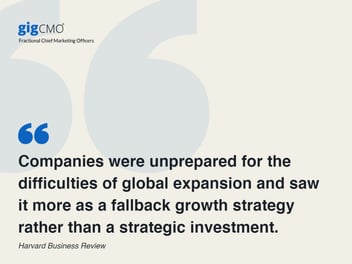
Expanding your business to a new country is a challenging process that requires a lot of effort, time, and resources. You need to learn about the new market and understand its dynamics before launching your product or service.
Success in a new market does not happen overnight, and it takes time to create demand for your offerings. To ensure a successful expansion, it is important to start from a strong position. Building a solid foundation enables you to make balanced decisions and focus on long-term growth rather than short-term wins.
What is a Business Model?
For established businesses, a business model is frequently a living document that is examined and improved over time. The Business Model Canvas is often likened to a condensed version of a business plan, and it is imperative to understand that it serves a distinct purpose and should not be viewed as a complete substitute for a comprehensive business plan. Rather, it functions as a foundation of your business plan.
A Business Model canvas consists of 9 elements, and it answers questions critical to strategic decision-making and business operations.
- Customer Segments – Who is your customer?
- Value Propositions – What makes you better than others?
- Channels – How do you communicate your value proposition?
- Revenue Streams – How will you make a profit?
- Customer Relationships - How will you engage with your customers?
- Key Activities – What marketing activities help deliver your value proposition?
- Key Resources – Who or what are your key resources?
- Key Partners - Who will support your business objectives?
- Cost Structure - What are the variable costs associated with operating your business?
The 4 Essential Components of a Business Model
A business model is a component of your overall business strategy. It focuses on four key areas: value proposition, value delivery, and value capture.
Value Proposition
The proposition will describe who your customers are and what you will deliver. A good Value Proposition Framework will help businesses communicate their unique offerings that not only highlight the unique selling points of a business but also deeply resonate with the target audience. The emphasis on clarity, strategic alignment, and targeted messaging ensures that businesses can differentiate themselves effectively in a competitive market. This differentiation is not just in the features of the product or service but in the way it's communicated, ensuring that the target audience perceives the offered value as distinct and superior compared to competitors. This clarity helps target audiences easily grasp the benefits, making it easier for businesses to connect with potential customers.
Value Demonstration
Demonstration is a crucial aspect of the go-to-market strategy. It's about showcasing how the offering addresses the specific needs and desires of the customers, highlighting its unique selling points and competitive advantages. Effective value demonstration requires a deep understanding of the target market's needs, preferences, and pain points. By tailoring the messaging and presentation to resonate with the audience, companies can effectively communicate how their offerings address specific challenges or fulfil desired outcomes.
Value Delivery
The delivery plan is a blueprint that describes how a company intends to organise itself to fulfil the proposal. To deliver value to its customer base, a company must first identify its customer segments, choose the most effective channels to reach them, and specify the type of relationship it wishes to establish with its customers.
Value Capture
The capture represents a hypothesis about how the proposition and delivery will work together to return value to the business. For a company to conduct its business, it needs to allocate funds towards key activities, key resources, and key partnerships. The costs associated with running a business can be categorised as either fixed or variable, or a combination of both. By taking advantage of economies of scale and outsourcing non-critical processes, a company can effectively reduce costs.
Business Model as the Foundation of a Business in the International Market
In the international arena, a robust business model becomes even more important due to the complexities and challenges associated with operating across borders. Here's how a solid business model forms the foundation of success in the international market:
Market Analysis and Entry Strategy
A comprehensive business model starts with a thorough analysis of the target market, including its size, growth potential, competition, regulatory environment, and cultural nuances. Based on this analysis, the company can devise an effective entry strategy tailored to the specific market conditions, whether it's through exporting, licensing, franchising, joint ventures, or setting up subsidiaries.
Value Proposition and Differentiation
Understanding the unique needs and preferences of international customers is crucial for developing a compelling value proposition. Expanding into international markets requires a thorough reassessment of the business model and value proposition to determine their suitability and effectiveness. This involves evaluating whether the existing value proposition for the home market can be adapted to meet the needs and preferences of international customers or if significant modifications are necessary.
Revenue Generation and Pricing Strategy
Generating revenue in the international market requires careful consideration of factors such as pricing strategy, distribution channels, and payment methods. The business model should outline how the company plans to price its offerings to remain competitive while ensuring profitability. This may involve adapting pricing structures to local market conditions, currency fluctuations, and varying levels of purchasing power across different countries.
Supply Chain and Logistics
Operating internationally involves managing complex supply chains and logistics networks to ensure efficient sourcing, production, and distribution of goods or services. The business model should address how the company will navigate logistical challenges such as transportation, customs regulations, inventory management, and how to deliver products to customers in a timely and cost-effective manner.
Cultural Adaptation and Localisation
Successful international businesses recognise the importance of cultural adaptation and localisation in building strong relationships with customers and stakeholders in foreign markets. The business model should include strategies for tailoring marketing messages, product features, and customer experiences to resonate with local tastes, preferences, and cultural norms. This may involve translating marketing materials, modifying product designs, or customising promotional campaigns to suit the cultural context of each market.
Risk Management and Compliance
Operating across borders exposes businesses to a range of risks, including geopolitical instability, currency fluctuations, legal and regulatory challenges, and intellectual property theft. A robust business model should incorporate risk management strategies to identify, assess, and mitigate risks effectively. It involves conducting due diligence on potential partners and ensuring compliance with relevant regulations in each market.
Conduct a comprehensive market expansion audit to assess new market opportunities, competition, and regulatory factors. Take the Market Readiness Assessment here.
gigCMO's Fractional CMO Service offers businesses the necessary expertise, resources, and support to establish a solid business foundation in the international market. Our playbook has been developed and tested repeatedly in real-life scenarios, continuously adapted to evolving challenges and opportunities and provides a powerful method of driving high returns on marketing investment.
- Customised marketing strategies tailored to the specific needs and goals of the business to help improve the chances of success in new markets.
- A proven methodology for global expansion that has been tested and refined over many years, helping businesses avoid common pitfalls and achieve success faster.
- A focus on data-driven decision-making, using market research and analytics to inform strategy and ensure that businesses are making the right decisions at every step of the way.
- Ongoing support and guidance throughout the global expansion process, including daily intervention and updates to ensure that businesses are staying on track and making progress towards their goals.
Contact us and take advantage of the resources available through gigCMO Fractional CMO Service to help you achieve your business's global aspirations.




